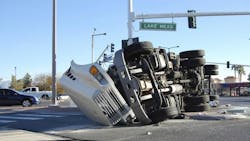FMCSA program allows carriers to challenge crash preventability
Today the Federal Motor Carrier Safety Administration (FMCSA) will begin accepting proposals from commercial motor carriers for its crash preventability demonstration program.
Last summer, the agency proposed a crash preventability demonstration program in which it would accept requests for data review (RDRs) to evaluate the preventability of certain categories of crashes through its national data correction system. Based on the feedback received in response to last year’s Federal Register notice, the agency detailed the crash types that will qualify for the demonstration program, the process for submitting RDRs to evaluate the preventability of a crash, how decisions on preventability will be displayed in agency systems, and the data to be collected through this program for use in future decisions about a longer-term crash preventability program.
Those who had an eligible crash that occurred on or after June 1, 2017, can visit DataQs to submit a Request for Data Review (RDR) with supporting documents, photos, or videos.
The following crash types are eligible for participation in the program:
- The CMV was struck by a motorist driving under the influence (or related offense)
- The CMV was struck by a motorist driving the wrong direction
- The CMV was struck in the rear
- The CMV was struck while legally stopped or parked, including when the vehicle was unattended
- The CMV was struck by an individual committing or attempting to commit suicide by stepping or driving in front of the CMV
- The CMV sustained disabling damage after striking an animal in the roadway
- The crash was a result of an infrastructure failure, falling trees, rocks, or other debris
- The CMV was struck by cargo or equipment from another vehicle
On Jan. 23, 2015, FMCSA announced the results of its study on the feasibility of using a motor carrier's role in crashes in the assessment of the company's safety. According to the agency, this study analyzed whether police accident reports provide sufficient, consistent, and reliable information to support crash-weighting determinations; whether a crash weighting determination process would offer an even stronger predictor of crash risk than overall crash involvement and how crash weighting would be implemented in the Agency's SMS; and how FMCSA might manage a process for making crash-weighting determinations, including the acceptance of public input.
Among the public comments, the American Trucking Assns. (ATA) provided a list of certain types of not preventable crashes and suggested that FMCSA establish a process by which documents demonstrating that the crash was not preventable could be submitted to justify removing these crashes from the motor carriers' records.
Based on ATA's recommendations and other feedback received in response to the January 2015 Federal Register notice, on July 12, 2016, FMCSA proposed a demonstration program to determine the efficacy of preventability determinations on certain types of crashes that are generally less complex. It proposed that a crash challenged through an RDR would be found not preventable when documentation submitted with the RDR established that the crash was not preventable.
According to FMCSA, the program allows the agency to gather data to examine the feasibility, costs, and benefits of making crash preventability determinations on certain crash types. FMCSA will use the information from the program to evaluate if these preventability determinations improve its ability to identify the highest-risk motor carriers.
FMCSA noted it will review RDRs submitted in the order received. If FMCSA reviews a crash and determines it to be not preventable, the agency will post a notification of the preliminary determination on DataQs for 30 days. During this time, anyone with documentation or data to refute the preliminary determination may go to DataQs and submit documentation that should be considered before a final determination is made.
About the Author
Fleet Owner Staff
Our Editorial Team
Kevin Jones, Editorial Director, Commercial Vehicle Group
Cristina Commendatore, Executive Editor
Scott Achelpohl, Managing Editor
Josh Fisher, Senior Editor
Catharine Conway, Digital Editor
Eric Van Egeren, Art Director
